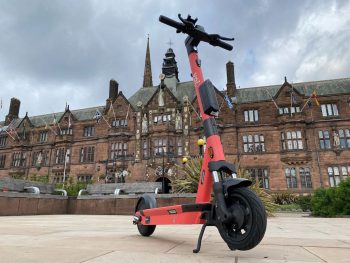Delays on e-scooter legislation could jeopardise micromobility rollout, warns Voi
The Government must set a clear date for e-scooter legislation or risk losing jobs and investment for “revolutionary and sustainable new transport”.

Voi says the gains made by the micromobility industry could be at risk if the Government is unable to give greater clarity on legislation
While trials of rental e-scooters were launched in July 2020 in 32 areas across England, planned laws to legalise private e-scooters have been delayed as the Government evaluates findings from the trials.
Now, e-scooter and e-bike hire company Voi has said that the gains made by the micromobility industry could be put at risk if the Government is unable to give greater clarity about when legislation will be brought forward.
Appearing before the Transport Select Committee today (8 February), Matthew Pencharz, head of public policy for Voi UK, Ireland and Netherlands, said: “Almost three years after the trials were first started, the demand for e-scooters is proven with Voi alone having 21 million rides, replacing over eight million car journeys.
“However, the industry doesn’t have certainty after May next year when the trials are currently due to end.
“Legislation will allow more cities and towns to use e-scooters as a sustainable method of transport for their communities, providing a firmer footing for the industry and the jobs and investment connected with it,” he stated.
In today’s meeting, the Transport Select Committee is revisiting the ongoing question of how private e-scooters should be regulated, and what has been learnt from the trial public-hire schemes in towns and cities across England. Evidence from the trials shows rental e-scooters can serve as a valuable mode of transport, including for commuting, and have progressively shifted riders away from private vehicles.
Voi says the Government should follow through with its commitment to create a new, light zero-emission vehicle category for e-scooters; the UK is one of the only countries in Europe which puts e-scooters under the same levels of regulation as cars. But the mobility firm points out that e-scooters are a fraction of the size, weight, power and speed of motor cars.
Its calling for a new vehicle category to be set up, eliminating the need for all riders to have either provisional or full driving licences, opening up micromobility to more riders.
The insurance required should be brought in line with e-bike regulation. This would enable insurance companies to create policies better suited to e-scooters. Currently operators must provide Motor Third Party Liability insurance, as for all motor vehicles.
It’s also urged for government guidance to be updated to provide a more detailed framework on the management of e-scooter schemes, detailing the need for set governance structures, data-driven decision-making and clear goals at the local level.












